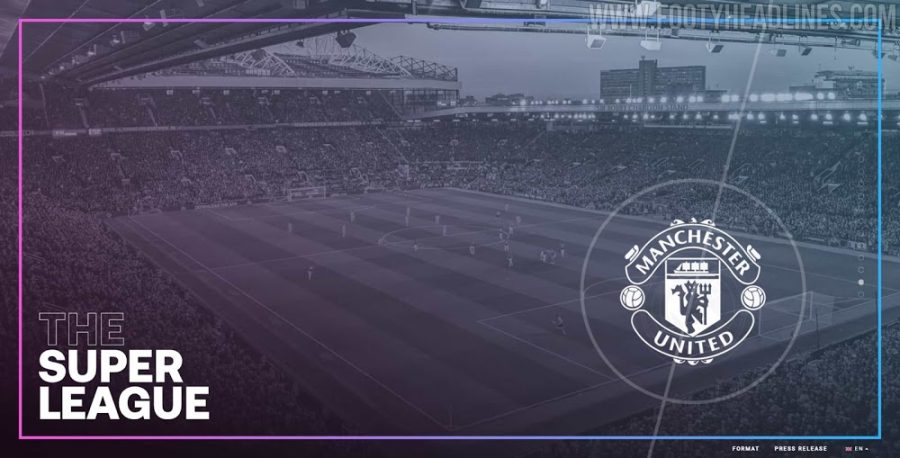The European Super League
Manchester United is one of the 15 Founding Clubs of the Super League. 3 of the initially intended Founding Clubs, Paris Saint-Germain, Bayern Munich, and Borussia Dortmund did not accept Perez’s invitation to join.
June 7, 2021
The European Super League launched this year on April 18, an intended replacement of the UEFA Champions League, which dominates European soccer as its premier continental competition. However, after just 3 days, on April 21, it seemed that the Super League had collapsed after 9 of 12 founding clubs announced plans to withdraw. Here, we’ll run down the proposed format of the league, the reactions and failures that forced its perceived collapse, and the messy aftermath.
The Super League sprung to life around midnight, April 18, as 12 clubs — Arsenal, Chelsea, Liverpool, Manchester United, Manchester City, Tottenham Hotspur, Inter Milan, Juventus, AC Milan, Atletico Madrid, Real Madrid, and Barcelona — announced their official joining of the competition. Plans to design and create the league had been in the works since 2009, according to the Guardian, primarily spearheaded by Florentino Perez, the president of Real Madrid Football Club.
Perez aspired for the Super League to provide a significant financial booster for its participating clubs. As a result, as the pandemic hit in 2020 and dramatically worsened the financial situations of all soccer clubs, Perez — whose Real Madrid had been hit particularly hard — stated that he felt even more pressed to form the league.
The Super League was proposed to feature twenty clubs that would compete in matches against each other each week during the weekdays. Fifteen of these twenty clubs were to be permanent members that maintained their membership within the Super League (dubbed “Founding Clubs”) while the remaining five clubs would be accepted based on performance in the domestic leagues. A corresponding women’s league was also planned alongside the men’s competition.
12 of the intended 15 permanent clubs were mentioned earlier to have joined on April 18. Meanwhile, the other 3 intended clubs — Paris Saint-Germain, Bayern Munich, and Borussia Dortmund — rejected Perez’s offers to join the league. In the league, Perez had aimed to host matchups of some of the most famous clubs in European soccer. This way, according to his statements to the Guardian, he believed that viewership of games would rise and increase revenues for clubs compared to the traditionally popular Champions League. Further, to support the formation of the European Super League, American banking giant JP Morgan lent the organization five billion in US Dollars.
Contrary to what Perez expected, intensely negative reactions of the Super League erupted from fans — British fans, in particular. This was mostly due to the league’s format. The traditional Champions League only accepted clubs that had reached or were near the top of their domestic league rankings the previous season, often welcoming and dismissing new competitors each new season. On the other hand, the Super League guaranteed entry to fifteen European clubs regardless of domestic performance the previous year. As a result, many opposing fans felt that the new league lost the “factor of merit” that defined entrance into the Champions League.
Amber Han (11), who plays for Yorba Linda’s women’s soccer team, reflects on the importance of teamwork and player performance in winning titles. ”The team with the 11 players that have worked harder on the field wins the game,” she says. “That team moves on to the next round, then the next competition, and that team make a name for themselves.”
Further, supporters of smaller clubs worried that the payouts from the Super League would suffocate clubs with less financial strength. So widespread were the reactions to the Super League that governments even became involved, with the French, Spanish, Italian, and English governments releasing statements condemning the newborn Super League.
Compared to the long years spent in brainstorming its format, the Super League seemed to have been quickly shut down within three days. By April 21, 9 of the 12 initial clubs announced plans to withdraw, leaving only Juventus, Real Madrid, and Barcelona. As a result, the league announced that it was “suspending [its] operations” although has made it clear that there will be plans made to “reshape the project,” as stated by the Athletic.
Ultimately, as the world turns towards the upcoming Champions League final, the European Super League, once the soccer world’s biggest headline in April, remains either buried deep in its stages of reconstruction or left to disappear in newspaper archives as a failed sports venture.





































